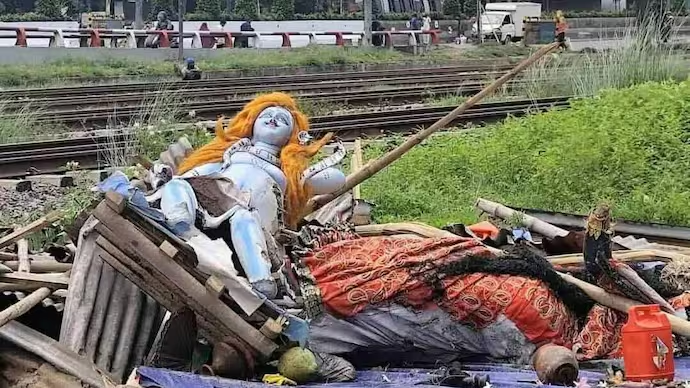India Condemns Durga Temple Demolition in Dhaka: Rising Extremism and Religious Insecurity in Bangladesh
- MGMMTeam

- Jun 27, 2025
- 4 min read
The recent demolition of a Durga temple in Dhaka’s Khilkhet area has triggered strong condemnation from India, reigniting concerns over the safety and rights of minority Hindu communities in Bangladesh. The incident, which occurred under the supervision of Bangladesh Railway authorities and armed forces, has been described as deeply disturbing by Indian officials and has further strained bilateral relations between the two neighbouring countries.

A Temple Reduced to Rubble Amid Extremist Pressure
The temple in question, though constructed on railway land, had stood as a place of worship for local Hindus. Its demolition came amid growing demands from Islamist extremist groups who had been publicly calling for its removal. Shockingly, the government failed to intervene or ensure protection for the religious structure. Instead, the interim administration led by Nobel laureate Muhammad Yunus defended the act by terming the temple’s presence as “illegal land use,” thereby dismissing the religious and emotional significance it held for the local community.
Video footage from the scene showed bulldozers razing the temple structure while the idol of Goddess Durga remained inside. Devotees, powerless and in tears, could only watch as the deity was damaged during the process. Indian sources claim this destruction was avoidable and accuse the Bangladeshi government of turning a blind eye to minority rights under the guise of administrative protocol.
India’s Diplomatic Response and Rising Frustration
Reacting sharply, India’s Ministry of External Affairs expressed disappointment and concern. Spokesperson Randhir Jaiswal stated that India was “dismayed that such incidents continue to recur in Bangladesh.” He emphasized that the responsibility for safeguarding the lives, property, and cultural heritage of minorities rests squarely with the Bangladeshi government. India has also underscored that this is not an isolated event, but part of a worrying pattern where minority places of worship are systematically targeted under various pretexts.
This incident follows a broader trend of diplomatic unease between the two nations. Since the departure of Sheikh Hasina and the rise of the interim government, India has imposed trade restrictions on Bangladeshi exports and expressed reservations about ongoing bilateral cooperation. With issues like water-sharing treaties and regional connectivity on the table, India is now pushing for stronger assurances regarding the protection of minorities as a prerequisite for continued engagement.
Voices of Grief from the Hindu Community in Bangladesh
Local reactions in Dhaka have been emotional and intense. Members of the Hindu community staged peaceful protests and mourned the loss of their temple. One devotee was quoted saying, “We have no place to pray. My body feels burned, and my heart ripped.” Such sentiments reflect the deep sense of betrayal and fear felt by religious minorities who have historically lived under the shadow of sporadic violence and state indifference.
Human rights organisations and minority advocacy groups, including the Bangladesh Hindu-Buddhist-Christian Unity Council, condemned the demolition. They called for the immediate reconstruction of the temple and the institution of protective mechanisms to prevent similar incidents in the future. Many also pointed out that while the temple was removed for being “unauthorised,” other structures on the same land—used for commercial or residential purposes—remain untouched, suggesting discriminatory enforcement of rules.
Recurring Pattern of Violence and Neglect
The demolition adds to a troubling history of attacks on Hindu religious sites in Bangladesh. During the 2024 Durga Puja celebrations, over 2,000 incidents of communal violence were recorded across the country. Temples were desecrated, idols were vandalised, and homes were burned, forcing hundreds of Hindu families to flee to India for safety.
These events are part of a longstanding issue dating back decades, with major anti-Hindu riots occurring in 2013, 2021, and numerous earlier episodes. Often, these attacks are linked to politically charged environments, inflammatory social media posts, or organized efforts by radical groups to create sectarian tensions. The lack of prompt legal action and the culture of impunity around such violence has only emboldened perpetrators.
The Road Ahead: Diplomacy, Accountability, and Secularism
India has made it clear that restoring faith and protecting minorities must become a top priority for the Bangladeshi government. Officials have called for a fair investigation into the demolition and urged the reconstruction of the temple. New Delhi has also stressed that meaningful bilateral dialogue—including over crucial matters like the Ganges water-sharing treaty—can only resume in an environment where human rights and secular values are upheld.
The broader international community, too, is watching closely. The United Nations and rights watchdogs have previously raised concerns over rising religious intolerance in South Asia. If Bangladesh aspires to retain its secular democratic image and maintain constructive relations with neighbours like India, it must act decisively to prevent further religious marginalisation.
Conclusion
The demolition of the Durga temple in Dhaka is more than a case of municipal land enforcement—it symbolizes a deeper failure to protect pluralism and uphold the rights of all citizens, regardless of faith. As India and Bangladesh navigate a delicate phase in their diplomatic relationship, the treatment of religious minorities will remain a litmus test of governance, justice, and civil society in the region. What happened in Khilkhet has not only hurt the religious sentiments of many but also shaken the foundations of mutual trust between two historically linked nations.
(Sources: NDTV, OpIndia, India Today)




Comments